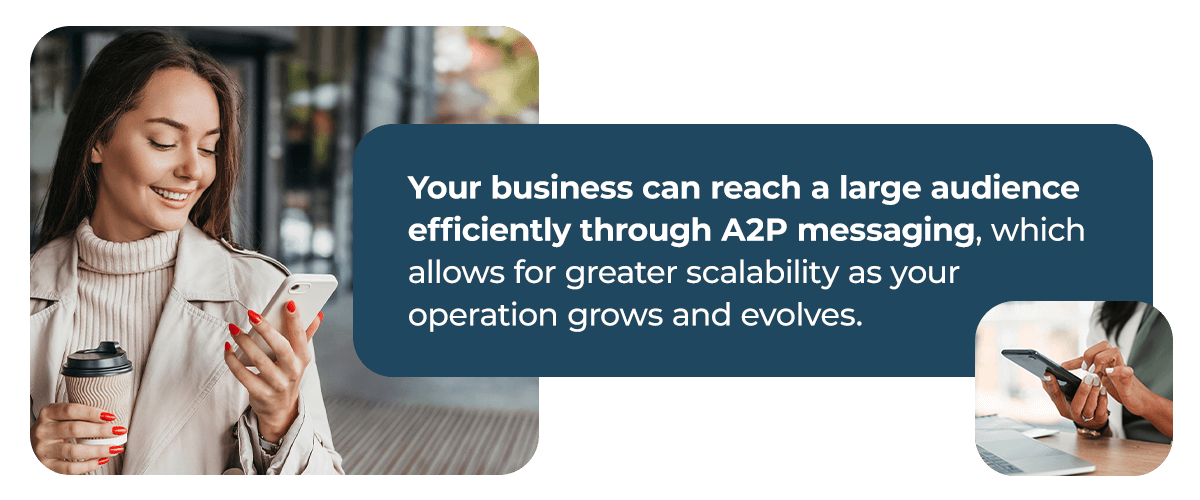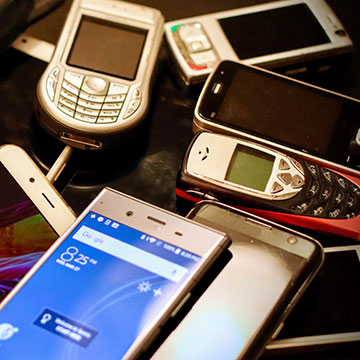
Effective communication is integral to business success. Your company can leverage short message service (SMS) messages to connect with customers, employees, vendors and other stakeholders. SMS is engaging, efficient and easy to master with the right tools. However, different types of SMS are better suited for certain uses and offer distinct advantages.
Explore the key differences between application-to-person (A2P) and person-to-person (P2P) messaging and why A2P is best for business communications.
What Is A2P Messaging?
Application-to-person messaging involves sending messages from a software program or web-based platform to an individual. These solutions typically harness the powers of automation to share a text after a specific event, behavior or trigger, such as booking an appointment or making a purchase.
Use Cases for A2P Messaging
A2P messaging can be a great SMS solution for businesses looking to share the following:
- Transactional notifications: Application-to-person messaging enables businesses to share automated notifications, updates and confirmations. For instance, a customer might receive a text from their bank after withdrawing money from their account, or an airline might share real-time flight updates with passengers.
- Marketing messages: Another use for A2P messaging is sending promotional content and marketing messaging, including discounts, announcements or special offers, to customers.
- Customer service assistance: Companies can also use A2P messaging for basic customer service interactions. Chatbots or other automated services can answer frequently asked questions, provide guidance or collect feedback.
- Timely alerts or reminders: A2P messaging is also handy for sharing a heads-up with your recipients regarding upcoming events or last-minute changes.
What Is P2P Messaging?
Person-to-person, sometimes referred to as peer-to-peer, messaging involves direct communication between individuals using the phone number assigned by their cellular provider (personal number) and the native texting application on their mobile phones.
Use Case for P2P Messaging
P2P messaging is a handy and convenient communication option for individuals to contact family members or send group messages to your friends while planning a birthday get together. It can foster meaningful social interactions and interpersonal connections, but it is not an ideal solution for business or enterprise communications.
Why P2P Messaging Isn’t Right for Businesses
There are a few key reasons why person-to-person messaging is not a great solution for businesses. Some top concerns include:
- Documentation: P2P messaging is not conducive to formal documentation that helps companies keep detailed and accurate records of their interactions with vendors, customers or employees.
- Collaboration: Having a back-and-forth conversation between two people is not ideal for team collaboration. P2P can make working with multiple stakeholders or sharing different file types challenging for your business.
- Ownership: A serious concern about using peer-to-peer messaging is who owns the data. Businesses would need to own both devices and numbers involved in a P2P exchange in order to have the rights to the messages, which could include sensitive or private information about your business.
Key Differences Between A2P vs. P2P SMS
Explore the key characteristics and differences between A2P vs. P2P below:
Purpose
A2P and P2P messaging serve two distinct purposes and play different roles in communication.
P2P solutions are best for personal communication and connection. They allow users to collaborate and get individualized attention through back-and-force interactions.
A2P solutions are primarily for transactional interactions, reminders and updates. This type of SMS is designed to keep people in-the-know, not necessarily invite them in on the conversation. Though, two-way communications with A2P can allow for the personal interactions if the company chooses to utilize it.
Message Volume
Another key difference between A2P and P2P messaging is the volume of messages each supports. P2P SMS typically involves one-on-one or small–group interactions and is better suited for personal conversations.
In comparison, A2P messaging supports sending texts to many individuals at once, with the recipients only receiving the message specific to them, they can then respond to you and only you will see their answer, unlike group messages on P2P texts where everyone sees everyone’s replies in the text chain. You can share timely updates or alerts with your entire contact list by the thousands if needed.
Sender Identity
With P2P messages, the recipient will see the phone number of the person sending, if that person is in their contact list the person’s name may appear in their caller id, depends on the settings and type of cellphone you have.
A2P messaging systems, have the option to use different types of phone numbers other than your average local phone number (like a 10-digit number in the US), they can also have short codes which is a 5- or 6-digit number, or a toll-free number, and in some countries alpha headers, like company names, can be used as the sender identity.
How You Pay For Messages
P2P messages are included on your personal cell bill, most often these days, there’s an unlimited amount of texts, but even if you go over your allotted quantity, the mobile provider will tack it on to your bill each month.
A2P messages are charged depending on location of sender and recipients, for example if you send from the US to a recipient in the US, it will cost less than sending from the US to Germany, and these costs are determined by the carriers. You’ll most often buy the texts or text credits upfront from your SMS service provider, not from the mobile carrier.
Benefits of A2P Messaging for Businesses
Businesses can enjoy many benefits from using application-to-person messaging, including:
Timely Updates
Delivering time-sensitive information is easy and effective with A2P messaging, thanks to automated tools and an open rate of 98% for texts.
A2P also allows your team to leverage automation to share texts with your recipients at opportune moments.
Scalability and Wider Reach
Your business can reach a large audience efficiently through A2P messaging, which allows for greater scalability as your operation grows and evolves.
Efficiency
Automated messaging tools help businesses save time and energy compared to manual outreach efforts. You can redirect your team’s attention to revenue-generating activities instead.
Personalization
Another significant benefit of A2P messaging for your company is using automation to personalize your texts. Personalization is incredibly powerful for boosting engagement and making recipients feel more valued.
Cost-Effectiveness
Compared to many traditional communication channels, including phone calls and paper mail, A2P messaging is very cost-effective. You can reach a large audience in seconds without a massive investment of time or money.
Engagement
People check their mobile devices’ notifications frequently throughout the day. For instance, Australians look at their phones nearly every eight minutes on average. Almost 57% of Americans said in one survey that they have an addiction to their cell phones.
Because consumers are always using their phones, text messaging is a great way to get in front of your target audience, boost open rates on your messages and enjoy greater engagement.
Schedule a Demo of the SMS From Red Oxygen Today
If you are looking to harness the benefits of enterprise SMS, turn to Red Oxygen. Our dynamic solutions allow your business to streamline and enhance communication with your team, customers and other companies.
You can get custom solutions tailored to your unique processes and existing infrastructure. Our technology will scale with your operation, making it easy to stay engaged with the people who mean the most to your business as it grows.
Are you interested in learning more about leveraging SMS? Contact Red Oxygen or schedule a demo of our solutions today!
























































